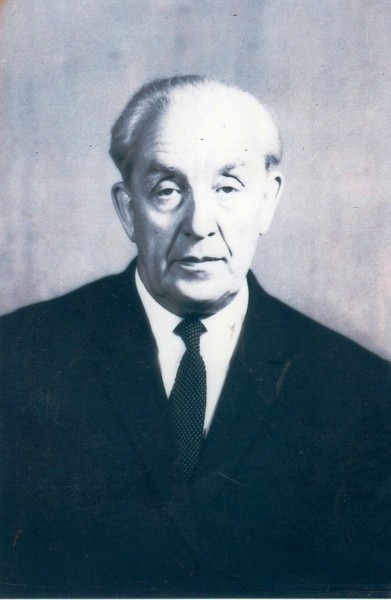Mychajlo Shyfrin
MEMORIES OF M.YU, SHIFRINA, KAND.TEKHN.NAUK, LAUREAT
USSR STATE PRIZE ABOUT TIME FOR LEARNING
In 1925, with the end of school, my childhood ended. This is not to say that it was bright and happy. For the period of my childhood fell the First World War. My adult relatives - the father and uncles were not its direct participants ... We were not refugees either, which accounted for a lot of suffering, but all the troubles that fell on the rear provinces of the warring country touched us to a much greater degree than, say, the Volga region or Siberia. My childhood fell on the February and October revolutions and the Civil War, especially the cruel in Ukraine, which brought destruction and famine.
During the civil war, Yekaterinoslav repeatedly passed from the hands of the "red" to the "white" and vice versa. I had a newspaper for several years, which stated that in 1918, 13 authorities were replaced in the city. The city was seized by the Petliurists, the Makhnovists, the Wrangel, the skins, the ataman Grigoriev and some Marusya. The city was also owned by the Reds — the workers' detachments, and then the regular troops of the Red Army. There was a period when there were three authorities in the city at the same time, whose troops fought among themselves.
After finishing school, I had a dilemma. - what to do next. In the incomplete 16 years I would not be accepted either in the university or at work. My father advised me to rest in the summer, and by the fall I would decide what to do. This is what happened. In Yekaterinoslav there were several vocational schools that trained skilled workers. But enrolling in these schools was also difficult, as in universities. Their doors were wide open for the children of the workers, and limited for the children of the peasants and a very narrow loophole left for the children of servants and handicraftsmen. By the autumn of 1925, the city opened a single paid vocational school, into which everyone who wanted to acquire a profession was placed and who were not able to find other ways. With the consent of the parents, I entered this school. I chose the chemical department, which attracted me more than the electromechanical one.
The school year 1925–1926 was held in a struggle organized by the students ’school committee (uchkom) with the directorate and the regional department of public education for transferring the school to free education, since the overwhelming majority of students were from poor families. Many classes have been missed. In the autumn of 1926 began the second year of study. From the first months of classes I realized that the vocational school would not give me the expected knowledge and I preferred to go to work. But it was not easy to get a job: after all, unemployment was great in those years. It was only through acquaintances of my father that I managed to get a job at a tannery that belonged to an artel that owned them on a cooperative basis.
My work activity began in January 1927. I worked at this plant as a dryer and glossy leather for more than a year, and I worked in the tanning room, where it was always wet and inhibited the stench from raw leather.
In 1928, in connection with the reconstruction of the plant, I was fired along with other workers. I was given a three-month salary, which was a substantial amount at the time. I decided to take advantage of temporary security (I also received unemployment benefits at the labor exchange) and to prepare for entering the Mining Institute.
A special feature of admission to universities in those years was the breakdown of applicants by curium. In total there were four curias - workers, peasants, servants and handicraftsmen. To the curia of workers they took those who had at least two years of working experience and the children of workers. I was assigned to the curia of servants, because I had not yet worked for two years. So in 1928, out of 120 places, 92 vacancies were assigned to curia workers, 12 to children of peasants, 12 to employees and 4 to handicraftsmen. In the curia of servants, 600 applicants applied for 12 places. The knowledge requirements for applicants were very high, but the workers were taken even if they did not pass the exams.
Despite the fact that I passed all exams with good points, I was not accepted to the institute with the wording "... because of the lack of places."
Naturally, I was very upset that I passed the exams well and was not accepted to the institute. We had to think about work. Unemployment was such that it was impossible to find work in the city. My father helped me again. He had a good friend, whose daughter was married to the chief engineer of one of the mines of Donbass, and he gave me a letter asking me to get a job at the mine. At the same time, I found out from the newspapers that an additional admission to the Polytechnic Institute would take place in Donetsk. I decided to go to Donetsk, to hold the examinations at the institute, and in case of failure to apply with the received letter about getting a job
In Donetsk, the competition was even greater than in Yekaterinoslav.
Images

Uplink: Stuff